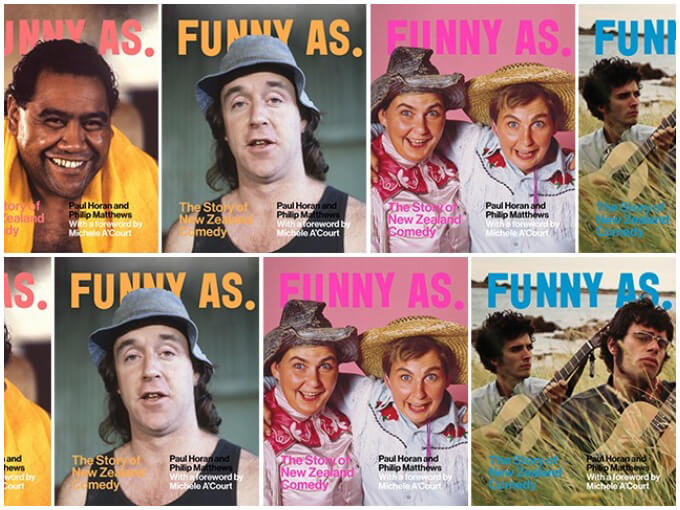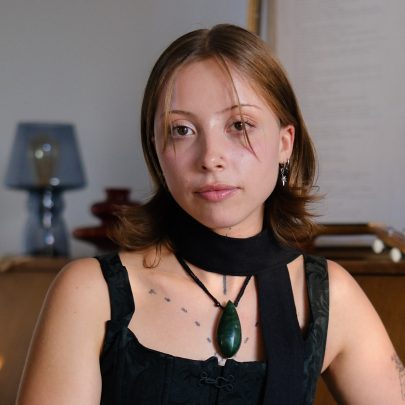Jul 29, 2019 Books
Tim Batt, funny comedian and member of the board of trustees of the New Zealand Comedy Trust, reviews Funny As: The Story of New Zealand Comedy, a book Paul Horan and Philip Matthews.
“Humor can be dissected, as a frog can, but the thing dies in the process and the innards are discouraging to any but the pure scientific mind.” The author of Charlotte’s Web said that. I don’t understand his preoccupation with animal fatalities, but he had a point. Discussing comedy is, usually, quite boring. A discussion of jokes between comedians is among the most tedious conversations you could overhear. This is why authors Paul Horan and Philip Matthews take pains at the outset of Funny As: The Story of New Zealand Comedy to warn you they will attempt no such thing.
Instead, this attractive coffee table book chronicles the historic and cultural pathways that made New Zealand comedy what it is today. It traces the trajectories of a humour distinctly our own which was forged in the trenches of World War One. The journey winds through the careers of Sir Howard Morrison, Billy T James, John Clarke, a pantheon of popular female impersonators, The Topp Twins, Flight of The Conchords, and to Rose Matafeo’s current international triumphs.
The book rightly states there is no direct path tracking New Zealand’s comedy history, no precise passing of the torch. It’s a messy world with diverse influences but the through-lines are captured. The direct line running from Don McGlashan and Harry Sinclair’s The Front Lawn, to Flight of the Conchords. The huge influence the gay, feminist, yodelling Topps Twins had on a cohort of now-dominant queer comedians like Chris Parker. How we had to make Melody Rules to get The Jaquie Brown Diaries.
This book has been written with a focus on (and obvious love for) our nation’s comedy performers, rather than focusing on people behind the scenes. While this inevitably gives an incomplete account of how New Zealand’s professional comedy industry came in to being, it’s a choice that stops the book feeling cold and academic. Every few pages you’ll hit moments of ‘Oh, I remember that Newsboy segment!’ or ‘Man, I forgot how messed up Peter Jackson’s early movies were.’
The exhaustive research undertaken by Horan and Matthews (primarily for the TVNZ series for which this book is a physical companion) has unearthed some amazing historic crossroads. Like something out of a Kiwi-made Bill and Ted, we learn in the early pages that Ernest Rutherford and Apirana Ngata co-wrote and performed comedy together at Canterbury College’s 1892 capping ceremony. “Is it only in New Zealand that people on the two highest denomination banknotes essentially co-wrote a comedy show together?” I’d bet a Sir Apirana on it.
As you’d expect while researching a country’s comedy tradition, the majority of stories haven’t been discovered hiding in vaults. They’ve been extracted from over 100 interviews conducted over the last year by the TV series’ production team. These oral accounts paint quite a rosy picture of our comedy industry’s culture. Michele A’Court (who provides the book’s foreword) says: “Comedians seemed different from the touring musicians. They weren’t trying to bed you – they were genuinely interested in encouraging your work. It felt collegial right from the start. Nice boys, no sleaze… The community felt like a safe place for a woman to be.”
The book frequently dips its toes into more problematic aspects of comedians pushing the envelope and the public reactions to it, particularly on race. Billy T James’ sketches are examined in the cold light of 2019 with Maori academics weighing in on the damage potentially done by having James trade on negative stereotypes of Maori. Similar accusations that were levelled at Taika Waititi’s Boy and The Naked Samoans’ bro’Town also get an airing. In each case, the creatives in question reply that their characters are drawn from their own world, perspective and experience. Funny As becomes more socio-politically introspective as it starts to wrap, and its authors point to the privilege afforded to Pakeha comedy-makers having no such responsibility to portray their racial identity in any particular way.
The historic lack of representation of non-male comedians is also chronicled throughout the years. Instead of dwelling in angst, Funny As documents and acknowledges this shortcoming and celebrates the amazing women who forged the path. The scene in 2019 is definitely different. Urzila Carlson is likely New Zealand’s most commercially successful comedian right now and rejects the idea of pay equality with her male counterparts. She wouldn’t want the pay cut. “It’s better being a woman in comedy at the moment, it has been for the last few years.”
There’s a story about John Clarke in the book which illustrates the importance and realities of our comedy scene so neatly, it approaches religious parable. Despite his success and notoriety for portraying Fred Dagg – an enduring character so beloved, it is the namesake of NZ’s top comedy award, Clarke and his wife were surviving on her teacher’s salary. The idea of attempting that nowadays seems comedic in itself but I digress. He was being paid a pittance for his wildly popular TV appearances. He left an EMI deal because the record company insisted on charging $9.99 for his comedy album, rather than the fan-friendly $4.99 Clarke wanted to charge. He kept a lid on ticket prices to avoid gouging his audience. Clarke recalls from the late 70s, “When I was doing television in New Zealand the head of the light entertainment department, as it was quite rightly known, said in public that I wasn’t funny. I started packing my bags relatively soon after. ‘See ya later’.” Clarke moved to Australia and enjoyed an expansive and varied professional career in television, writing, film and more.
For many, Clarke’s move while enjoying iconic comedic status may seem absurd. But for anyone in, or familiar enough with the creative arts, this is a singularly unshocking story.
All the common ingredients are there – the artist going to war with a money-grabbing conglomerate to protect his audience. A partner outside of public view whose toil is allowing Clarke to continue to exist in entertainment. An ego bruised by the words of one person, rather than buoyed by the love of a whole country. And ultimately, a clueless gatekeeper who is the final straw after years of underappreciated effort (and even success!)
Funny As is a worthwhile venture. You should watch the TVNZ series because it is entertaining and comedy tells our history without an elite lens. This book is an entertaining journey through our comedy history. The jokes, the shows and the people who brought them to us. But more importantly, this project has a kaupapa. New Zealand has, until quite recently, vastly underestimated and underappreciated our comedy scene. In New Zealand, we only venerate our sportsmen. For any other citizen, a big head is a cardinal sin to will get you instant pariah status. That has consequences. Even with Taika dominating cinema internationally, 7Days celebrating ten years on the telly and Rose Matafeo winning arguably the most prestigious live comedy award in the world, we have chronic under-funding in the comedy scene from funding bodies. Comedy isn’t valued here as it should be. That’s why our best people leave.






